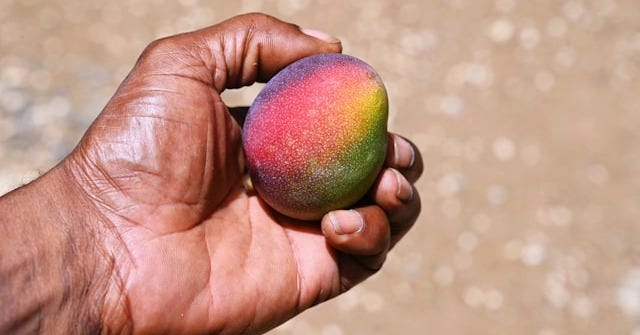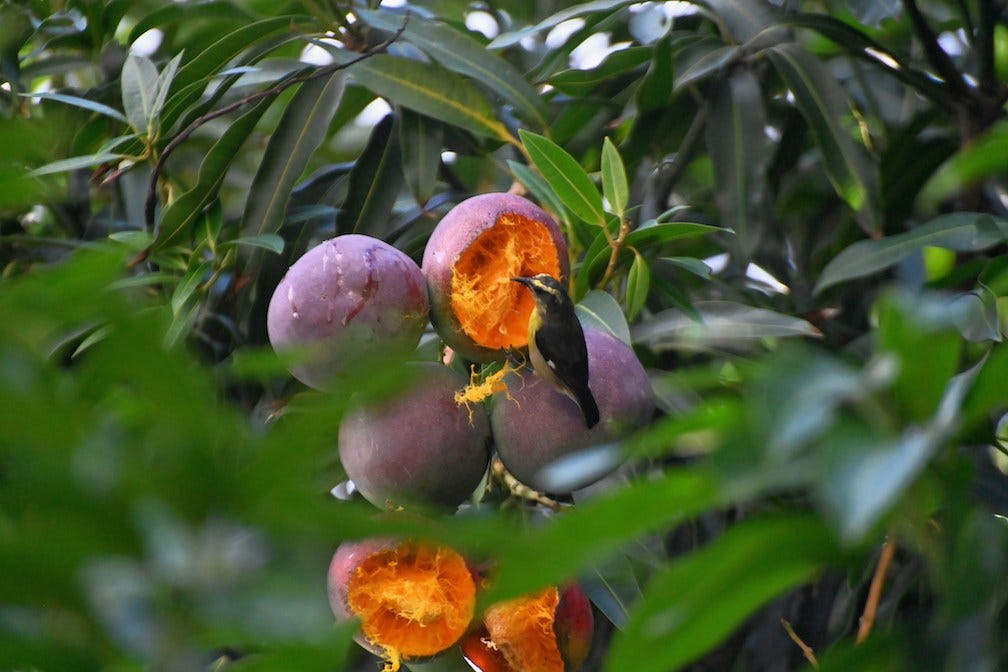Mango Time:
the United Nations nature of fruit (part one)!
There was a time in my teenage years when my first stop on getting home from school was up the mango tree in our front yard in College Common, Kingston, Jamaica. I wouldn’t even take my school uniform off. I would get up in that tree, and find the perfect mango - it would be the one that would release itself willingly into my hand when I nestled my palm up to it.
Sitting in a crook of the tree, I would rip the skin off with my teeth. No knife needed (do you know where that knife has been?) Then sinking my face into the delightful orange flesh, the juices running down my face, my whole head jutting forward to prevent the escapee mango bits from getting on my school uniform, I would devour that fruit - and it was an experience of heaven on earth.
My mother sometimes reminded me during mango season that I needed to eat other food groups too. One cannot live on mangos alone, but it sure is a delight to try.
For me, mangos are gifts directly from the hand of God. A freshly picked, or more accurately, “released” mango provides so many gifts: an aroma, a weightiness in the hand, flavour, nourishment, fibre, a sense of provision and delight … all gifts.
Hiking in the blue mountains of Jamaica, I remember seeing mangos fallen on the ground or hanging in the trees. How marvellous that this humble import from India, from the far east, had made its way into parts of Jamaica where there weren’t even drive-able roads.
You see, mangos are not “indigenous” to Jamaica. They were a result of immigration that was not “permitted”, immigration that was not necessarily allowed so much as imposed on the indigenous people of the land. We have a term for that in history: “colonization”. But today, when people enter without permission, it has a different term “illegal immigration”.
Mangos are an import brought from the far east, without permits, which spread far and wide to bear much fruit all over. Smattering the landscape with little segments of heaven. If I were to put this in the language of modern politics, one could say the mango does not have birthright citizenship. The fruit is the child of a plant that never got official citizenship or official permission to be on the land, so what birthright does the fruit have?
One could reason it has no birthright to citizenship. But then, who does?
Perhaps it doesn’t have stamped citizenship papers, but from our family home on Wellington Drive in Kingston, the mango served many citizens (other than our family who became Jamaican by naturalization): bees, worms, nectar eating creatures, fruit bats and a variety of birds.
The mango trees, illegal immigrants the lot of them, are community feeding posts. Mango trees became part of the ecosystem, part of a world which co-exists in harmony, where, believe it or not, there is room for all.
I would never imagine saying to a mango: your parent tree didn’t have the proper paperwork to be living here, so you are not welcome.
Get out.
May the neighbours to the south of Canada, to the north of Jamaica, see the simple wisdom of birthright citizenship: born and bourne to us directly from the hand of God.
Photos by Karl Callwood on Unsplash




I loved reading this piece Janaki to learn about your early life. Lovely to join you in this Lenten study I felt I would like to share a little of who I am.I was born in Liverpool England and moved to Canada with my husband 2 years after we were married. We went back home after 3 years and my daughter was born while we were living with my parents. Returned to Canada with our baby daughter and had 2 sons. Now a widow since 1995 with grandchildren and great grandchildren and living in a lovely residence at 94 years old I am truly blessed.
You raise a good point. I believe breadfruit, and possibly jackfruit are also "illegal: immigrants in Jamaica, as well as curry leaves, and much of the leafy greens that Ammi grows in her backyard. Borders and boundaries are the work of men, mangos and such delites are the work of God. :-)